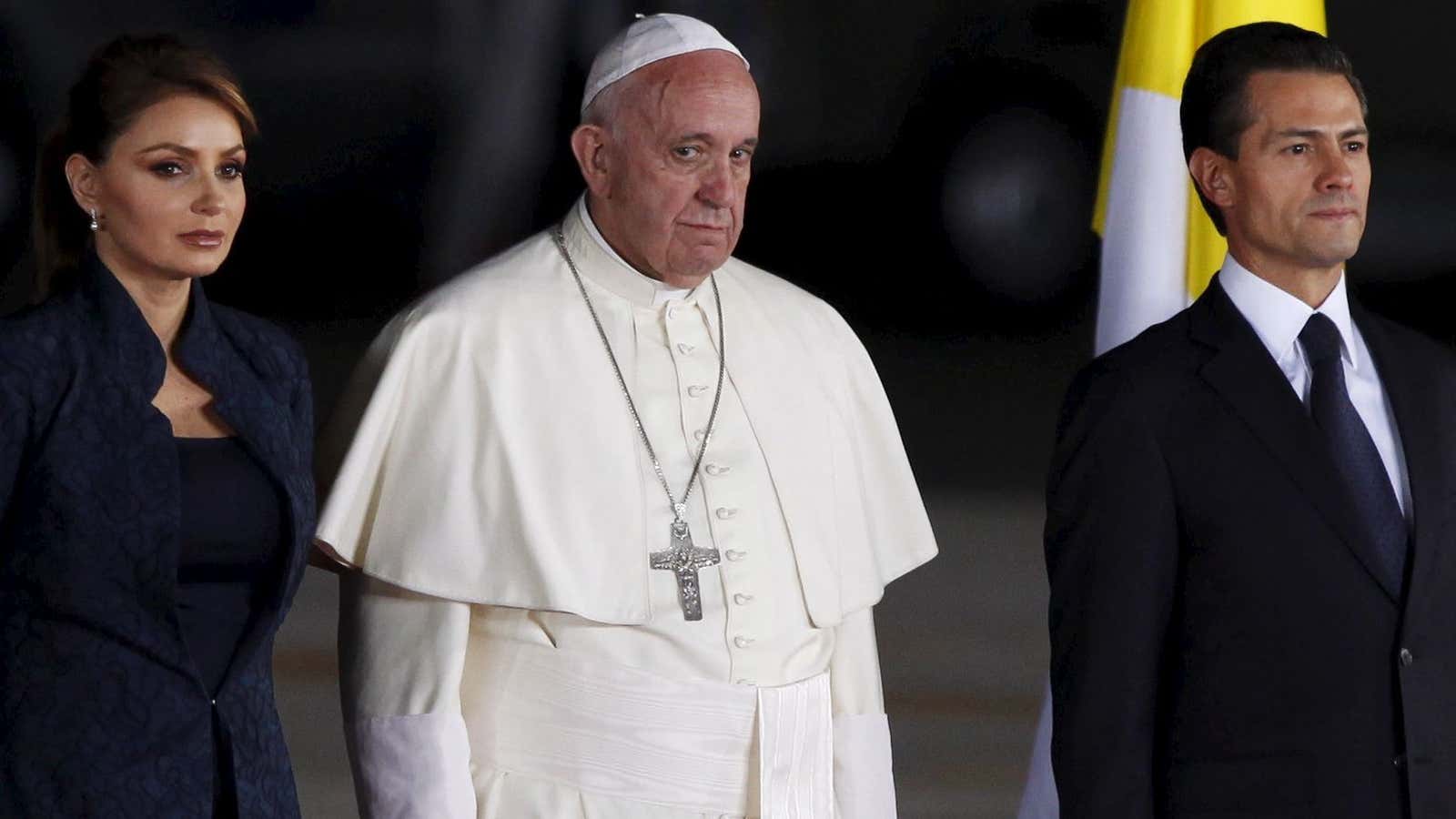For Pope Francis, who ended his visit to Mexico on Wednesday (Feb. 17,) there were few topics or institutions too taboo to tackle. During his six-day stay, he took on drug trafficking, the government’s failure to provide economic opportunity, corruption, discrimination, human trafficking, and even employee exploitation.
His itinerary, a tour of places tattered by drug violence, and poverty, or both, already suggested that “el Papa Francisco,” as he is known in Spanish, was going to address Mexico’s biggest ills. But experts were surprised by the sharp focus on political and social issues, and his harsh tone. It’s a departure from the more spiritual approach taken by previous popes—and even by Pope Francis himself in the past.
“He’s really taking off the gloves,” Andrew Chesnut, Chair in Catholic Studies at Virginia Commonwealth University, tells Quartz. “We haven’t seen him this prophetic and this outspoken in any of his previous national tours.”
In Ciudad Juárez, just a few years ago one of the deadliest places on earth, he compared Mexico to Nineveh, an ancient city “so used to degradation” that its inhabitants had lost all sensibility to pain.
“No more death, nor exploitation!” he said during a mass in the border city. ”There’s always time to change.”
It’s unclear if his message will shake Mexicans into action, but hundreds of thousands were at least listening. More than 80% of the country’s population is Catholic, making it the second-biggest congregation in the world after Brazil.
Here are Pope Francis’s main qualms with Mexico:
The root of all evils
Francis was the first pope to be received at Mexico’s National Palace, the seat of the executive power, but that didn’t stop him from criticizing his hosts. After graciously shaking president Enrique Peña Nieto’s hand, he essentially laid down the blame for the country’s biggest problems (link in Spanish) at the feet of its ruling class.
Without naming any names, he said societies that benefit a few at the expense of many, breed “corruption, the drug trade, the exclusion of different cultures, violence and even human trafficking, kidnapping and death, causing suffering and putting a brake on development.”
He didn’t stop there, telling political and civic leaders they are responsible for helping every Mexican obtain “adequate housing, dignified work, food, real justice, effective security, and a safe and peaceful environment.” Later, in Juárez, he told the local business community to place more value on human than on monetary capital. ”God will hold today’s slave drivers accountable,” he said (Spanish.)
Don’t keep bad company
Authorities were not the only ones to get an earful from Pope Francis. In a speech in the state of Michoacán, another drug-trade hotspot, he urged young Mexicans to stay close to the church and away from drug cartels (Spanish), even if they seem like the best option amid a lack of job and education opportunities.
“Jesus would never invite us to be hired assassins, instead he calls us to be disciples,” he said.
God, he told them, wants them to build communities and feel like citizens, the best defense against drug trafficking and its threats.
An apology owed
The pope also chided all Mexicans, including the church, for failing the country’s indigenous communities (Spanish), which remain the poorest in Mexico. Speaking in the southern state of Chiapas, where about a quarter (Spanish, pdf, pg. 9,) of the population is indigenous, he said the world has much to learn about their culture, but instead has “systematically and structurally” excluded them and snatched their lands.
“How sad!” he said. “What good it would all do us to examine our conscience and say ‘Sorry!’”
A undeniable humanitarian crisis
The pope called attention the plight of thousands of immigrants who caravan through Mexico on their way to the US, “a road plagued with terrible injustices” including kidnapping and extortion.
“Not only do they suffer from poverty, but on top of that they suffer from these forms of violence,” he said during his last mass, celebrated next to Juárez’s border with El Paso, Texas.
Do your job
He saved his harshest words (Spanish) for the church itself, telling a cathedral full of bishops to stop infighting and focus on confronting drug trafficking—and its evil consequences.
The complexity and immense scale of the drug-cartel problem call for “prophetic courage,” he told them, and encouraged them be on the front lines to make Mexico “a land that doesn’t have to cry for men and women, young people and children that end up being destroyed at the hands of death traffickers.”
“Woe to you if you rest on laurels,” he told them.
The church’s rank-and-file (Spanish) also got scolded by Francis, who told them not to resign themselves to the violence, corruption, and human-rights violations that surround them by hiding behind church walls.
Some gaping omissions
But for some in Mexico, the pope wasn’t tough (Spanish) enough. He didn’t talk about church sex-abuse scandals, including the case of Rev. Marcial Maciel, a now-deceased church leader who was a pedophile. And despite pleas for a papal audience from the relatives of 43 students who disappeared in the state of Guerrero, an incident that has become a symbol of the country’s security crisis, Francis declined (Spanish.) He left without mentioning the still-unresolved case.




